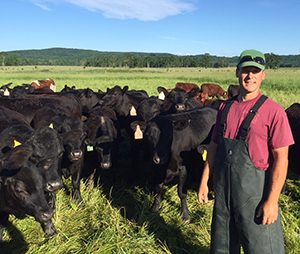Speak up for more options for livestock farmers
If we want a resilient food system, we must rebuild the small- and mid-scale infrastructure that is needed to allow small- and mid-scale farmers to get food from their farms to the consumers. And nowhere is the need more obvious than with meat processing.
The federal government has taken several promising steps recently, including announcing significant grants to help small-scale processors expand their operations. But while this will help small-scale processors handle the expense and burdens of federal regulations, it doesn't address the underlying issue: that the regulations are ill-suited for small-scale operations. It's a bit like paying someone to roll a boulder up a hill, instead of looking for an alternative route that doesn't require going up the hill!
 One important federal reform that would build just such an alternative route is the PRIME Act, which would allow farmers to take their animals to "custom slaughterhouses" and then sell the meat within their state, either direct to consumer or to restaurants and retailers who in turn sell direct to consumer. This means transparent, accountable meat sources to supply our local communities.
One important federal reform that would build just such an alternative route is the PRIME Act, which would allow farmers to take their animals to "custom slaughterhouses" and then sell the meat within their state, either direct to consumer or to restaurants and retailers who in turn sell direct to consumer. This means transparent, accountable meat sources to supply our local communities.
Custom slaughterhouses are regulated and inspected, but under rules that are more reasonable for small-scale operations. And this reduced regulation is achieved without sacrificing food safety: The USDA has stated that it has no reports of any foodborne illnesses linked to a custom slaughterhouse since at least 2012. Custom slaughterhouses are already operating safely in every state, processing meat for hunters, homesteaders, and "cow share" owners.
We have fought for this bill for several years and are getting closer to passing it. It has been re-introduced this year as H.R. 3835 and S.2001.
The PRIME Act is an important step to provide scale-appropriate regulations that we need for small-scale processors to diversify our food system, empowering independent farmers to feed their local communities.
TAKE ACTION:
Call your U.S. Representative and both of your U.S. Senators and urge them to sign on to H.R. 2825/S. 2001. You can look up who represents you at our Elected Officials Lookup page.
Below is a sample message for your call or email. Use this sample message only as a starting point - put the ideas into your own words and focus on why this is important to you. But personalized messages are the best way to convince legislators!
SAMPLE MESSAGE:
As a constituent, I urge Senator (or Representative) _____ to co-sponsor S. 2001/H.R. 3835, the PRIME Act.
The COVID pandemic shone a spotlight on the problems with our consolidated meat industry. We need more small-scale farmers and independent processors, but the one-size-fits-all USDA regulations stand in the way.
Custom slaughterhouses represent a smarter, scale-sensitive approach to regulation. They must meet federal and state standards, but without some of the aspects that are unduly expensive and burdensome for small-scale operations. A typical custom slaughterhouse processes fewer animals in an entire year than a typical large plant does in a single day. Custom slaughterhouses have shown that scale-sensitive regulations work well - the USDA has no records of any foodborne illness traced to any custom slaughterhouse in the last eight years.
The PRIME Act simply allows farmers who want to sell their meat within their own state to use these custom slaughterhouses, just as they are already used by hunters and homesteaders in their state.
This would provide immediate relief for many farmers who are facing the prospect of going out of business because they must wait one to two years to get their animals processed at an inspected plant due to the COVID crisis. And in the long-term, it creates greater opportunities for new small-scale custom slaughterhouses to open, building the infrastructure we need for a more resilient, robust food system - without spending more tax dollars.
The PRIME Act supports local food production and small businesses, while also reducing vehicle miles traveled with livestock trailers, and helping to meet the consumer demand for locally raised meat.
Please support consumers and small farmers by signing on to H.R. 3835/S. 2001 as quickly as possible.
Name
City, State
If you are a livestock producer, take a few extra minutes and ask to speak to the staffer who handles agricultural issues. Briefly explain to the staffer any problems you have faced with lack of access to inspected slaughterhouses, and how the PRIME Act would help your business and benefit your customers. And then send an email to follow up, asking them to let you know if their boss supports the bill.
MORE INFORMATION:
Federal regulations take a one-size-fits-all approach that has favored the largest meatpackers - despite the fact that they have caused numerous foodborne illness outbreaks. Small-scale processors struggle to deal with the regulations, particularly as they are applied by USDA inspectors who are biased against small-scale operations after decades of federal policies that told producers to "get big or get out."
As a result, small-scale livestock farmers have few places they can take their animals for processing. In some areas of the country, the nearest USDA or equivalent state facility may be several hours' drive away or more.
There are alternatives, known as "custom slaughterhouses," which legally operate in many states. But the meat from them can only be provided back to - and consumed by the family of - the person who owned the animal when it entered the slaughterhouse. A farmer who wants to sell his or her beef, lamb, goat, or pork to consumers at a local farmers' market or other local outlet cannot use a custom slaughterhouse.
The PRIME Act repeals the federal ban on the sale of meat from custom slaughterhouses, allowing flexibility for states to permit producers to sell meat processed at a custom slaughterhouse within the state.
Custom slaughterhouses are, and will remain, subject to federal regulations, as well as state regulations. They are, and will continue to be, inspected by government agencies, although they do not have to have an inspector on-site during the actual processing (making them similar to the way most food is processed in this country).
READ MORE
Read our sign-on letter FARFA sent to the Senate in 2020 (note that the bill number was different).
